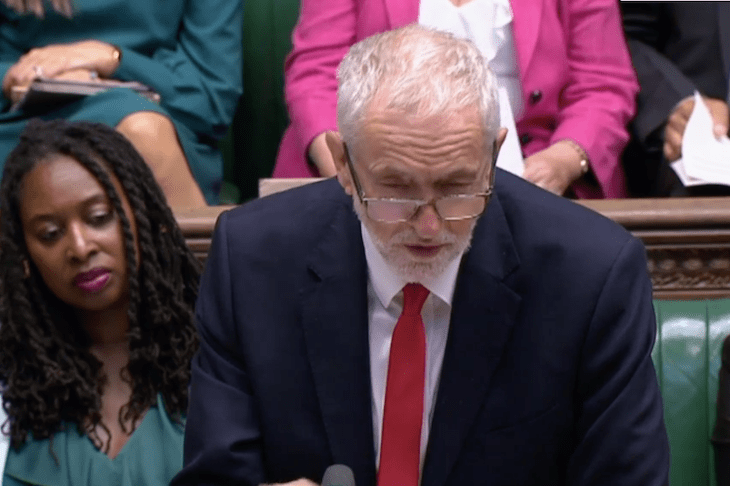Today’s Prime Minister’s Questions provided a rather dispiriting summary of the current political scene. The two leaders of the main political parties ended up having a fight on whose party had the bigger racism problem, sparked by tweets from the US president telling black and minority ethnic Congresswomen to ‘go back’.
Jeremy Corbyn tried to open the session on climate change, but Theresa May had, unsurprisingly, turned up clutching the advert placed by Labour peers in today’s Times, which said Corbyn had ‘failed the test of leadership’ because of his attitude to anti-Semitism.
And so the exchanges moved to a predictable format. Corbyn retorted that his party was the first to pass anti-racist legislation, suggesting that Labour therefore couldn’t be racist, merely because it said it wasn’t. And he then brought up the problem of Islamophobia in the Conservative party, claiming 60 per cent of Tory members think Islam is a threat to civilisation. So the argument from both sides was essentially ‘well, my party might be racist, but yours is worse’. Not particularly edifying stuff.
The advert from Labour peers is indeed highly significant. Members of the House of Lords have more freedom to attack Corbyn because they have no local party waiting to deselect them. But it is still a big thing to do to air criticisms like this in public, suggesting that the peers feel their private channels of communication with the Leader’s Office have broken down irreparably.
Their intervention is also the latest in a series of public criticisms from Labour parliamentarians and staff members which are adding to the sense that the leadership does not have a grip on the party. This, of course, is exactly what Corbyn’s opponents have been planning for – on which more in tomorrow’s Spectator.
The response from Corbyn’s spokesman this afternoon illustrated how those around the leader approach complaints generally, whether anti-Semitism or sexual harassment. He told journalists that ‘many have a public record of opposition to Jeremy Corbyn’, but that the leadership recognised there were concerns about anti-Semitism. Complaints are always viewed through a political prism: if you’re complaining about how the party handles anti-Semitism, it is not because you are worried about Jew hatred, but because you want to undermine Jeremy Corbyn. Complaints against political allies are to be suppressed or dismissed, while complaints against enemies are useful tools. The problem for Corbyn is that a critical mass in his party now doesn’t see it that way, which ironically makes him more politically vulnerable.







Comments